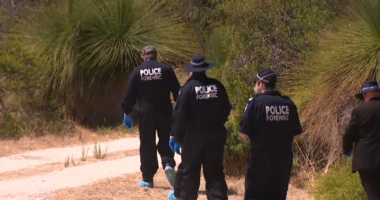Share this @internewscast.com
President Donald Trump speaks during a luncheon with African leaders in the State Dining Room of the White House on Wednesday, July 9, 2025, in Washington (AP Photo/Evan Vucci).
A federal appeals court has turned down the Trump administration’s effort to revive and enforce President Donald Trump’s executive order that sought to end birthright citizenship.
In a 48-page opinion released on Wednesday, the U.S. Court of Appeals for the Ninth Circuit, through a consolidated case, confirmed a set of lower court rulings that blocked the contentious attempt to alter the established right.
Penned by U.S. Circuit Judge Ronald M. Gould, a Bill Clinton appointee, the 2-1 opinion unequivocally rejects the Trump administration’s efforts to revoke the basic constitutional right.
“We address whether the Executive Order is constitutional and valid,” the opinion reads. “We conclude that the Executive Order is invalid because it contradicts the plain language of the Fourteenth Amendment’s grant of citizenship to ‘all persons born in the United States and subject to the jurisdiction thereof.’ We have jurisdiction.”
In the underlying cases, a collection of states, including Washington, Arizona, Illinois and Oregon – and individual expectant mothers – won universal injunctions against the birthright citizenship ban.
The panel, however, declined to exercise jurisdiction over the expectant mothers’ case, reasoning that their claims are likely covered by a class action out of New Hampshire and that holding onto the claims “may conflict with or circumscribe the flexibility of” the relief granted by the Granite State federal court. This technical distinction does not amount to much of a difference, however, because the court determined that maintaining the nationwide bar was “justified in order to give complete relief” to the state plaintiffs.
In ruling this way, the panel aims to align its reasoning with the recent U.S. Supreme Court opinion narrowing down the pathways for nationwide, or universal, injunctions.
In the landmark decision, the high court’s majority said “the complete-relief inquiry is more complicated for the state respondents,” and, without fully analyzing the issue, left open the question of whether a universal injunction might be the only vehicle possible to “provide the States themselves with complete relief.”
The Ninth Circuit, taking that opening, ruled in the states’ favor and offered a new perspective on the oft-granted injunction against the birthright citizenship revamp.
“The district court below concluded that a universal preliminary injunction is necessary to provide the States with complete relief,” the opinion goes on. “We conclude that the district court did not abuse its discretion in issuing a universal injunction in order to give the States complete relief.”
The Trump administration, for its part, has begrudgingly, for now at least, conceded some argumentative points – and accepted courtroom losses – on the availability of lesser injunctions barring the application of the birthright citizenship ban for smaller groups of people.
Here, the panel says, the plaintiffs themselves – several states – have their claimed injuries so tied to who they are and what they do as states, that a limited injunction would not be sufficient.
“States’ residents may give birth in a non-party state, and individuals subject to the Executive Order from non-party states will inevitably move to the States,” the opinion continues. “To account for this, the States would need to overhaul their eligibility-verification systems for Medicaid, CHIP, and Title IV-E. For that reason, the States would suffer the same irreparable harms under a geographically-limited injunction as they would without an injunction.”
In other words, the basic administration of several federal programs is highly contingent on whether certain families can access the continued grant of birthright citizenship.
The states, for their part, pointed to demographic data about noncitizens and how families seek and obtain coverage under the state versions of those aforementioned federal programs.
The opinion explains the interplay here, at length:
The States have presented evidence that more than 1100 infants born each month in the Plaintiff States would be subject to the Executive Order. If those infants are denied citizenship, they will be ineligible for federally-backed state-run programs such as Medicaid, CHIP, and Title IV-E foster care. States generally do not receive federal reimbursements based on services to individuals who do not have a lawful, qualifying immigration status. The States accordingly allege that they will lose millions of dollars of contracted reimbursements that they would otherwise receive.
The panel’s ruling is the first full-on rejection of the federal government’s arguments on the merits with full briefing.

President Donald Trump listens as White House deputy chief of staff for policy Stephen Miller speaks on his first 100 days at Macomb County Community College Sports Expo Center, Tuesday, April 29, 2025, in Warren, Mich. (AP Photo/Paul Sancya).
Earlier this year, a different panel unanimously declined an emergency motion from the administration seeking a partial stay of the lower court’s nationwide injunction in the state plaintiffs’ case, declaring: “Citizenship by birth is an unequivocal Constitutional right.”
The Wednesday night merits decision, by any measure, should come as no surprise with the new panel. During oral arguments in June, the judges were highly skeptical of the U.S. Department of Justice’s position.
The court’s basic analysis of the birthright citizenship executive order treads on familiar territory.
In the fashion of every other court to consider the issue, the panel relies on the interpretation of the 14th Amendment’s citizenship clause supplied by the 1898 Supreme Court opinion in U.S. v. Wong Kim Ark. The landmark opinion stands for the proposition that all persons physically within the country – unless specifically listed in the 14th Amendment – are subject to U.S. jurisdiction and therefore, their U.S.-born children are citizens.
The panel spends considerable time surveying arguments advanced by the DOJ as to why other sources of text and history – aside from the 14th Amendment and Wong Kim Ark – support their efforts. Ultimately, the panel found those arguments unconvincing.
From the opinion, at length:
The district court correctly concluded that the Executive Order’s proposed interpretation, denying citizenship to many persons born in the United States, is unconstitutional. We fully agree. The Defendants’ proposed interpretation of the Citizenship Clause relies on a network of inferences that are unmoored from the accepted legal principles of 1868. This runs the risk of “‘extrapolat[ing]’ from the Constitution’s text and history ‘the values behind [that right], and then . . .enforc[ing] its guarantees only to the extent they serve (in the courts’ views) those underlying values.'” We reject this approach because it is contrary to the express language of the Citizenship Clause, the reasoning of Wong Kim Ark, Executive Branch practice for the past 125 years, the legislative history to the extent that should be considered, and because it is contrary to justice.
The majority opinion was joined by U.S. Circuit Judge Michael Daly Hawkins, another Clinton appointee.
The dissent was penned by Trump-appointed U.S. Circuit Judge Patrick J. Bumatay. The lone holdout would have found the state plaintiffs lacked standing – a way to short-circuit and deny their claim without formally considering the merits.














